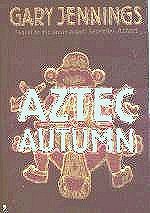






Jennings' best known work, I feel sure, will probably remain the blockbuster, widescreen The Journeyer, surely the ultimate in travel reading, with Jennings, himself proving no slouch in the itchy-feet department, retracing Marco Polo's wanderings extensively for the novel, just as he was to join several different circuses to properly research Spangles and explore remote corners of Mexico for the Aztec novels, even including maps of The One World; New Spain, that the reader might more easily obtain reliable bearings.
As with all Jennings' books, the reader is gripped not so much by the plot, though this is always authentically plausible, as by the synthesis of unfolding events, the skill with which Jennings creates and blends incidents and occurences authenticated by vividness of background description and characterization. As with the works of Joseph Heller, some scenes in each novel are so brilliantly painted, so horrific in cruel detail that we retain them forever in mental snapshot. With no effort whatsoever, I can recall in detail the fate of the young servant in The Journeyer, and the dwarf couple in Spangles...and the beloved teenage daughter in Aztec.
And Aztec Autumn, while perhaps a more mellow sequel, has, still, its share of bloodthirsty history as the Spanish colonization presses relentlessly on despite pockets of opposition and rebellion. Yet we are seeing, too, that these white usurpers begin to bring enlightenment, benefits, even stability to these lands where warring families have plotted and schemed, where violence has been a way of life, and even the Gods are cruel, their priests jealous indeed! We sense an awareness from our central character, who begins his story at the age of 18, that the newcomers have something positive to offer his people, even though, at first, his eyes cannot see so clearly the grey tones through the black and white lenses of youth .
But viewpoints change as maturity sharpens our inner vision, and, by the closing of the story, the dying old man can reflect on a long lifetime of survival , of dramatic changes, of deeds accomplished and lessons learned.....and, at the end, find the New Land good.
And on his last night, , the old man dictates his summing up, an epilogue that Jennings could not have known would be his own last word on the great hybrid society America has become:
Vale, Raymond Jennings and thankyou..
On August 27th., 1998, I was leaving Chico, Northern California, to drive South to Los Angeles and San Diego, and my friend ,Rich, mindful of my tendency to read, (and follow) maps as though still in the southern Hemisphere, proffered some advice. I should he said, drive South, and stay on anything that said South, but that if the road sign began speaking to me in Spanish, I would have gone too far and should turn back.
I thought he was joking, of course, but next day, when I was unable to get anything other than Spanish-type music on the car radio, I began to think about the Spanish influence on the area I was driving through. And when I saw Raymond Jennings' new book in the Manhatton Beach bookstore, released as a mass-market paperback just that week, I bought it, of course, to carry further South still, and I read it with pleasure back home in Australia, bringing to it, now so much more extensive a background schema than would have been possible before I sojourned in the USA, revelling in the familiar placenames and geographical features, marvelling at the origins of customs still practised, never dreaming, of course, that this was to be Jennings' last book, that his literary career would end so abruptly with his death on February 13th this year.


 "...Yes, let me just say one thing more, and please put it at the end of your chronicle. Our Mixton War is lost, and rightly so. I should never have begun it. From the day of your Grandfather Mixtli's execution, I resented and resisted the aliens among us. But, over time, I have met and admired many of th ese aliens--the white Alonso, the black Esteban, the padre Quiraga, your mulata mother, Rebeca, and finally you, dear daughter, who commingle so many different bloods. I realize now--and I accept--I am even proud--the YOUR lovely face, Veronica, is the new Face of The One World. To you, and to your sons and daughters and to The One World, I wish you all good things."
"...Yes, let me just say one thing more, and please put it at the end of your chronicle. Our Mixton War is lost, and rightly so. I should never have begun it. From the day of your Grandfather Mixtli's execution, I resented and resisted the aliens among us. But, over time, I have met and admired many of th ese aliens--the white Alonso, the black Esteban, the padre Quiraga, your mulata mother, Rebeca, and finally you, dear daughter, who commingle so many different bloods. I realize now--and I accept--I am even proud--the YOUR lovely face, Veronica, is the new Face of The One World. To you, and to your sons and daughters and to The One World, I wish you all good things."
This last book has not let you down....!

Want To Check Out Price And Availability of the most readily available edition?
 |


 Reactions, Comments and suggestions to: robink@mail.austasia.net
Reactions, Comments and suggestions to: robink@mail.austasia.net